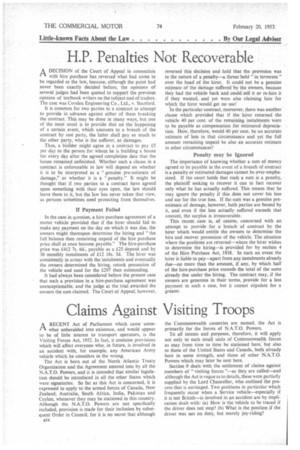H.P. Penalties Not Recoverable A DECISION of the Court of
Page 50

If you've noticed an error in this article please click here to report it so we can fix it.
Appeal in connection r-k with hire purchase has reversed what had come to be regarded as the law, because, although the point had never been exactly decided before, the opinions of several judges had been quoted to support the previous opinion of textbook writers on the subject and of traders. The case was Conden Engineering Co., Ltd., v. Stanford.
It is common for two parties to a contract to attempt to provide in advance against either of them breaking the contract. This may be done in many ways, but one of the most usual is to provide that on the happening of a certain event, which amounts to a breach of the contract by one party, the latter shall pay so much to the other party, who is the sufferer, as damages.
.Thus, a laPuilder might agree in a contract to pay £5 per day to the person for whom he is building a house for every day after the agreed completion date that the house remained unfinished. Whether such a clause in a contract is enforceable in law will depend on whether it is to be interpreted as a " genuine pre-estimate of damage," or whether it is a "penalty" It might be thought that if two parties to a contract have agreed upon something with their eyes open, the law should leave them to it, but the law has never taken that view, as persons sometimes need protecting from themselves.
If Payment Failed In the case in question, a hire-purchase agreement of a motor vehicle provided that if the hirer should fail to make any payment on the day on which it was due, the owners might thereupon determine the hiring and "the full balance then remaining unpaid of the hire purchase price shall at once become payable." The hire-purchase price was £412 7s. 6d.; payable as a £25 deposit and by 30 monthly instalments of £12 18s. 3d. The hirer was consistently in arrear with the instalments and eventually the owners determined the hiring, retook possession of the vehicle and sued for the £297 then outstanding.
It had always been considered before the present case that such a provision in a hire-purchase agreement was unexceptionable, and the judge at the trial awarded the owners the sum claimed. The Court of Appeal, however, reversed this decision and held that the provision was in the nature of a penalty—a threat held "in terrorem " over the head of the hirer. It could not be a genuine estimate of the damage suffered by the owners, because they had the vehicle back and could sell it or re-hire it if they wanted, and yet were also claiming hire for which the hirer would get no use In the particular contract, moreover, there was another clause which provided that if the hirer returned the vehicle 40 per cent. of the remaining instalments were to be payable as compensation for estimated depreciation. How, therefore, would 40 per cent, be an accurate estimate of loss in that circumstance and yet the full amount remaining unpaid be also an accurate estimate in other circumstances?
Penalty may be Ignored
The importance of knowing whether a sum of money agreed to be payable in the event of a breach of contract is a penalty or estimated damages cannot be over-emphasized. If the court holds that such a sum is a penalty, the plaintiff seeking to recover it can in fact recover only what he has actually suffered. This means that he may ignore the penalty if this does not cover his loss and sue for the true loss. If the sum was a genuine preestimate of damage, however, both parties are bound by it, and even if the loss actually suffered exceeds that amount, the surplus is irrecoverable.
This recent case is, of course, concerned with an attempt to provide for a breach of contract by the hirer which would entitle the owners to determine the hire and recover possession of the vehicle. The situation where the positions are reversed—where the hirer wishes to determine the hiring—is provided for by section 4 of the Hire Purchase Act, 1938. In such an event the hirer is liable to pay—apart from any instalments already due—no more than the amount, if any, by which half of the hire-purchase price exceeds the total of the sums already due under the hiring. The contract may, if the owners are generous in their terms, provide for a less payment in such a case, but it cannot stipulate for a greater.




















































































